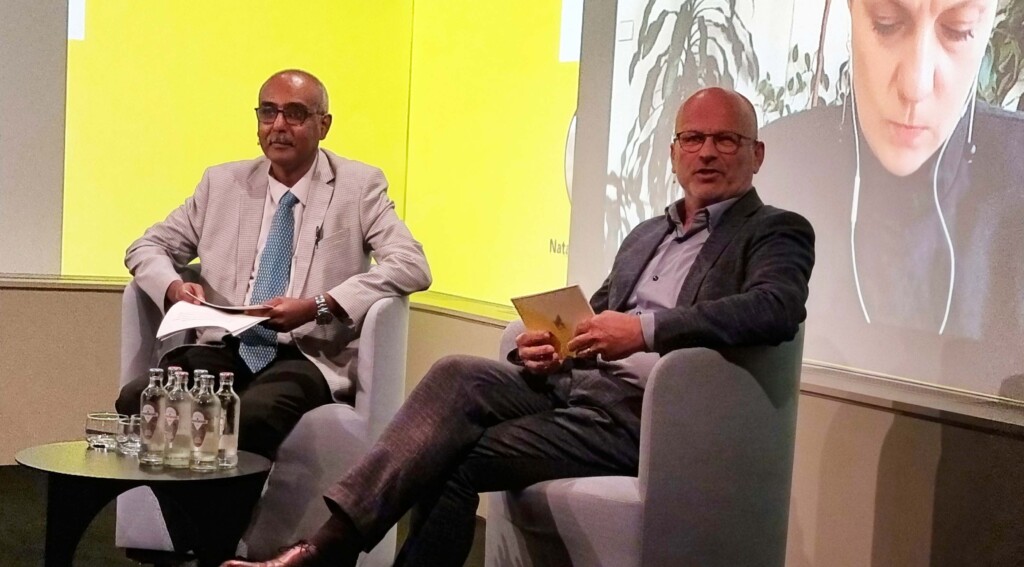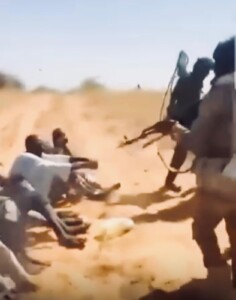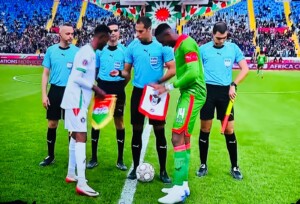‘Access to reliable info is a lifeline in war-torn Sudan’

Rashid Saeed (l), Radio Dabanga’s Team Leader, Verification and News Gathering, participating in a panel discussion on journalists in conflict zones during the Free Press Live 2024 event at in The Hague, the Netherlands on Monday (Photo: AMB / RD)
In war-torn Sudan, access to accurate, independent information is a necessity for life for ordinary civilians, as well as the millions of internally displaced people and refugees suffering under what has become the world’s most acute humanitarian crisis. “Since the outbreak of the current conflict between the Sudan Armed Forces (SAF) and the paramilitary Rapid Support Forces (RSF) in April 2023, 90 per cent of the infrastructure of media institutions has been destroyed, journalists have been killed, targeted, detained, tortured, or forced to flee abroad,” Rashid Saeed, Radio Dabanga’s Team Leader, Verification and News Gathering, emphasised on Monday at the Free Press Live 2024 event at in The Hague, the Netherlands. “We can be independent, but we cannot be neutral, and our priority must be to bring a stop to the war in Sudan.”
The event is organised annually by the Netherlands-based international press freedom organisation Free Press Unlimited, with this year’s theme ‘Media: a lifeline in times of conflict’. Journalists from several conflict zones spoke about the impact on and role of media during conflict. Radio Dabanga’s Rashid Saeed joined a panel discussion that included Ekaterina Kotrikadze, news director of the exiled Russian news platform TV Rain; and Natalya Gumenyuk, a Ukrainian journalist and author specialised in conflict reporting. Representatives from Free Press Unlimited gave an overview of the situation in crisis countries Nicaragua, Venezuela, Myanmar and Bangladesh.
Saeed: “The war led to the cessation of the activities of many of the media outlets in the country, and all outlets in Khartoum. The war forced the displacement of many journalists. Many journalists are still stuck in border areas due to the complications of the procedure of entry visas… In addition, journalists in western Sudan, especially in Darfur, live in worse conditions, where armed clashes are intensified by the participation of tribal militias and ethnic armed groups.” He enumerates the grim statistics: 11 journalists killed, 445 detained and tortured, amid a deliberate internet and communications blackout in 80 per cent of the country.
‘We can be independent, but we cannot be neutral, and our priority must be to bring a stop to the war in Sudan…’ – Rashid Saeed, Team Leader, Verification and News Gathering, Radio Dabanga
Saeed laments that “despite continuous attempts to monitor violations, the fate of dozens of journalists in the five states of Darfur remains unknown, due to the difficulty of establishing contact with them or with their families and friends. Journalists cannot move around or inside the conflict areas due to the lack of protection and non-compliance with international treaties in this regard and the violation of the Jeddah agreement [to protect civilians in Sudan].”
Saeed, whose portfolio within Radio Dabanga includes verification, expains: “There is no information from independent sources about the military or humanitarian situation, except from the two warring parties. A small number of journalists working for Arab satellite channels are still working in the war zones. They rely on their cellphones and pictures and videos taken by cameras installed on the roofs of buildings or those captured by civilians with mobile phones. Only few independent Sudanese media outlets continue to work from outside Sudan.”
He told the gathering that with as the world’s most acute humanitarian crisis unfolds in Sudan, independent media and access to information are a lifeline to people on the ground. Radio Dabanga has therefore set priorities on how we cover the crisis, to highlight the humanitarian situation, to report on the war itself, to report human rights violations, and document the peace and political process.
“The citizen is the centre of our coverage, giving human faces to our stories, personalising our coverage,” Saeed says, “so we maintain a bottom-up news flow. Combating hate speech, delivering verified news coverage, combating fake news, all while ensuring the safety of our sources in the ground.”
During the event, the winners of the Free Press Awards 2024, which annually honour two outstanding and brave journalists were announced. The Most Resilient Journalist Award of 2024 goes to Mohammed Zaanoun, who has documented life and death in Gaza for over 20 years. The Newcomer of the Year Award, presented to young journalists who show great determination, talent and commitment, was given to Aike Beyshekeeva, a journalist from Kyrgyzstan where press freedom is strongly deteriorating.











 and then
and then